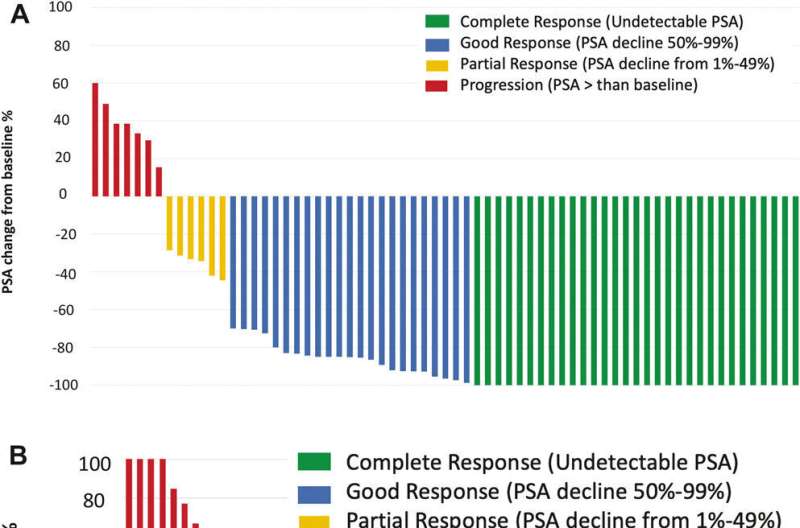Treatment without hormone blockers improves outcomes in solitary prostate cancer metastases

For patients with solitary metastases from prostate cancer, an approach called metastasis-directed therapy (MDT)—focused treatment using surgery or radiation therapy, without androgen deprivation therapy (ADT)—can slow the time to cancer progression, reports a study in the Journal of Urology.
"Metastasis-directed therapy has been a controversial approach to management of solitary metastatic recurrences of prostate cancer," comments lead author Jack R. Andrews, MD, of Mayo Clinic Arizona, Phoenix. "Our study is the first to show benefits of both surgical and radiation therapy MDT without ADT in this group of patients, potentially delaying the need for systemic treatment."
MDT as potential alternative targets area of cancer spread
Metastasis-directed treatment has emerged as a potential alternative for men with "oligorecurrent" prostate cancer—a state of disease with a limited number of metastatic lesions after initial treatment. In the MDT approach, surgery or radiation therapy (steretotactic body radiation therapy, or SBRT) is used to specifically target the area of cancer spread.
That's in contrast to ADT, systemic therapy to block testosterone and other male sex hormones, which promote the growth of prostate cancer. Androgen deprivation therapy with or without other systemic therapy is the standard treatment for metastatic prostate cancer, but has numerous adverse effects that can decrease quality of life—including sexual dysfunction, bone thinning, and loss of muscle strength, among others. If MDT is effective in controlling limited recurrences, it may avoid or delay the need for ADT.
Dr. Andrews and colleagues evaluated their center's experience with MDT, without ADT, in 124 patients with oligorecurrent prostate cancer between 2008 and 2018. Treatment consisted of surgery in 67 patients, most with lymph node metastases; and radiation in 57 patients, most patients with bone metastases. In both groups, average follow-up time was about four and a half years.
Promising results with MDT for oligorecurrent prostate cancer
Both forms of MDT were effective in terms of biochemical recurrence, reflected by reduction in prostate-specific antigen (PSA) level. After surgery, PSA level decreased by about half in 80.5% of patients after MDT. Most patients eventually needed ADT or other systemic therapy for progressive cancer—median time 18.5 months. However, at three years' follow-up, 29% of patients were alive and free from cancer progression.
In the radiation therapy group, 40.3% of patients had a one-half reduction in PSA level. Median time to systemic therapy was 17%, while three-year progression-free survival was 17%. The researchers emphasize that their study was not designed to compare the outcomes of surgery and radiation, as the two types of MDT were used in patients with different kinds of cancer metastases (lymph node versus bone).
"The role of MDT in prostate cancer remains highly controversial, with insufficient evidence for recommendations in current guidelines," Dr. Andrews and coauthors write. They point out some key limitations of their study—including selection bias related to the fact that patients opting for MDT were likely a "healthier, most robust" group seeking a more aggressive treatment option.
"These results suggest that MDT without ADT can delay initiation of systemic therapy" in men with oligorecurrent prostate cancer, Dr. Andrews and colleagues conclude. They call for further studies to determine which patients with solitary metastases can benefit the most from MDT.
More information: Jack R. Andrews et al, Metastasis-directed Therapy Without Androgen Deprivation Therapy in Solitary Oligorecurrent Prostate Cancer, Journal of Urology (2022). DOI: 10.1097/JU.0000000000002898



















